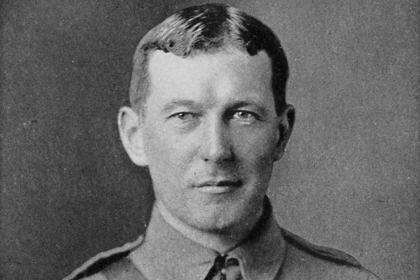Dr. John McCrae (1872-1918) wrote "In Flanders Fields," the most influential poem associated with World War I. At the Larner College of Medicine, we are proud to count him as part of our rich and deep history.

Lt. Col. John McCrae, M.D., late Professor of Pathology at the former University of Vermont College of Medicine. (Courtesy photo)
Authored by guest blogger Kate Bright, an administrative assistant for the Dana Medical Library, this UVM Medicine blog post is titled "The College Celebrates John McCrae, M.D., Faculty Member & Author of In Flanders Fields."
Dr. John McCrae (1872-1918) wrote "In Flanders Fields," the most influential poem associated with World War I. At the Larner College of Medicine, we are proud to count him as part of our rich and deep history: From 1903 to 1911, he served as professor of pathology at the University of Vermont. On November 14, 2016 at 2:30 p.m. in the Larner Classroom, author Susan Raby-Dunne will speak about her newest book chronicling John McCrae’s fascinating life, just in time for Veteran’s Day. “What begins as an interest becomes a seven-year obsession as Raby-Dunne follows Lt. Colonel John McCrae’s footsteps from Canada, through the battlefields of Flanders, to France where he died and is buried,” said Raby-Dunne.
In conjunction with this presentation, Dana Medical Library will have an exhibit on display exploring McCrae’s life and accomplishments in pictures, memorabilia, and books.
John McCrae: Physician and Soldier
Along with his professorship at the UVM Medical College, John McCrae excelled at three professions simultaneously in his short 46 years. A physician, a poet and a soldier, he hailed from Guelph, Ontario and came from a strict Scottish Presbyterian faith. At the age of 16, he won a full scholarship to study biology at the University of Toronto, then went on to medical school there studying biology, zoology, and practical anatomy. At the same time, he entered the military at a young age as a bugler, then later as a gunner, in his father’s battery. He made the rank of lieutenant by the time he graduated from college in 1898. He excelled at almost everything he did, graduating with highest honors and accepting a prestigious internship at Johns Hopkins Hospital in Baltimore to study under the famous pathologist, William Osler. Osler became a good friend and is known to have influenced John in his path to study pathology. He returned to Canada to continue these studies as a Governor’s Fellow at McGill before being assigned to command the right section of D Battery in the Boer War in South Africa.
Returning from the Boer War in 1901, he resumed his work as a pathologist at McGill and took numerous appointments at several hospitals in subsequent years, including his professorship at UVM in 1903. It is known that he and other professors would take the train down to Burlington from Montreal in the morning and return in the evening. “He was regarded as the chief of lecturers since he had an encyclopaedic knowledge and he filled in for others when they could not go. In his early articles he took pride in calling himself a professor of pathology at the University of Vermont.” (Prescott, 48) At this time, he was well-known as a pathologist, teacher and clinician.
His time serving in the Boer War in South Africa affected him deeply. Although he came back a seasoned soldier and served admirably, he disliked the experiences of war. He was to resign from the military in 1904 and wouldn’t be a soldier again until the outbreak of World War I in 1914. His deep sense of duty would propel him into the Great War, which would ultimately cost him his life. He would not die on the battlefield, but in a hospital bed from the sickness that he had once studied: pneumonia.
The Poet
His wrote continuously throughout his life as a means of relaxation, and was published frequently in magazines and newspapers. In Flanders Fields, his most famous poem, is known by all for its reference to the iconic symbol of the poppy, representing those who have fallen on the battlefield. He wrote this poem after his experiences in the battle at Ypres in 1915 where he saw a comrade blown to bits. Death was a common theme in his poetry even at an early age. Perhaps he always felt a closeness with death, not only because of the people that he had lost, but because of his constant battle with his own health and mortality. He was an asthmatic from a young age.
The different parts of his life (physician, poet, and soldier) seemed to blend together seamlessly to form a life that was a tapestry of duty, faith, a need to care for others, comradery, a love of animals, humor, creativity and extraordinary intellect. These aspects were fused together and unbreakable and were constantly reflected in his writings, whether it be his frequent letters home to his family or his most cerebral poems on death.
We take away a sense of pride that this human being, for a brief time, was a part of our community. He has become an important figure in our history who had the opportunity to make an impact not just as a famous poet but as a well-respected professor. Because of the kind of person that he was, John McCrae had his own way of contributing to shaping the minds of medical students at UVM. We can most definitely say that he brought intelligence, humor, and compassion to his professorship and, for that, we can be most grateful.
Note: For a list of noted references, view this post on the UVM Medicine blog.